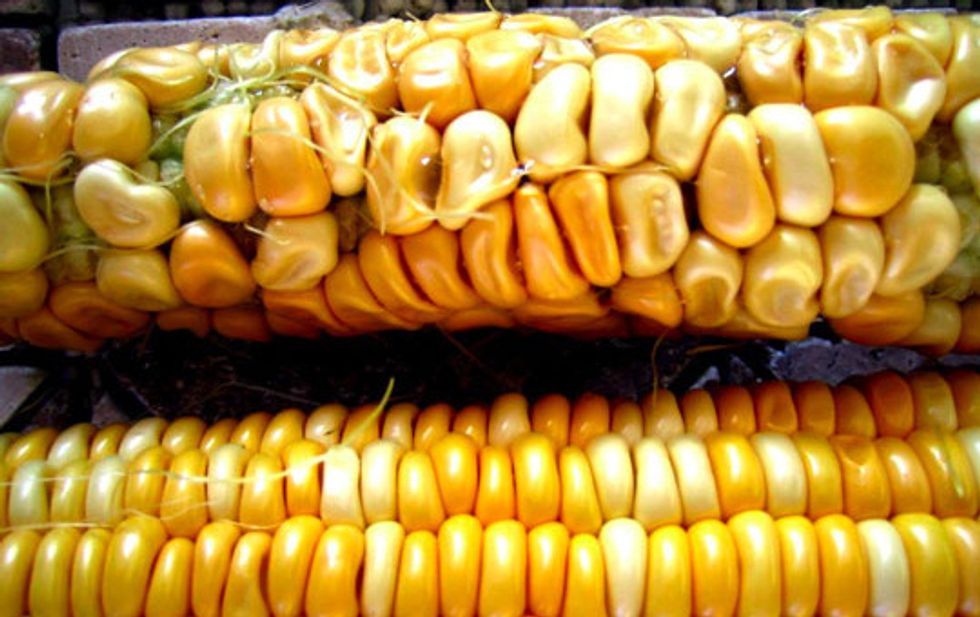Being the Michigan Sugar Queen, I thought it was high-time for me to put my agricultural knowledge to the test. However, not just about sugar but a topic that is highly controversial within the agricultural industry.
GMOs, otherwise known as a Genetically Modified Organism, sound pretty scary and I have the full undisclosed truth about them.
They are harmless.
Yes, you heard correctly, HARMLESS to you as an individual, safer for the environment, and provide cheaper sources of food for YOU, the consumer.
Now that is the scary truth. But before you think to yourself “this girl doesn’t know what she’s talking about” or “she’s just looking for attention” as I’ve heard time and time again, I’m asking you to hear me out and continue reading the rest of my article because I've grown up in the industry and have the behind the scenes knowledge to back up my information.
First, what exactly is a GMO?
A Genetically Modified Organism is created by scientists intentionally taking the desired gene from one plant and using it on another plant. These plants then undergo extensive testing and research before being offered to the American farmer to be planted.
You may be asking yourself why that is necessary?
Well, to have a successful farm at economically affordable prices, it is necessary to genetically modify organisms to prevent increased damages from weeds, diseases, insects, and extreme weather conditions. By genetically modifying an organism, farmers are able to use far fewer chemicals because they are able to make crops such as sugar beets resistant to various types of diseases, insects, and weeds. With increased resistance to outside influences, crop yields steadily become higher over time raising the production of certain crops on the same amount of land.
So what does that mean for the average American?
With our growing population and shrinking available farmland, GMOs become a staple for the American farmer to continue to be able to feed the world on the same amounts of land that were needed in the previous decades. Long story short, GMOs provide YOU with food and prevent the unfavorable outcome of food shortages.
How are GMOs safer?
If GMOs can resist drought, that means more food for you, the consumer, at lower prices and more economic profit, keeping the agricultural industry alive (and with low prices for farmers the way they are currently, this is extremely important).
What crops are Genetically Modified in the United States?
There are currently eight Genetically Modified crops in the United States including Rainbow Papaya, Field Corn, Canola, Soybean, Alfalfa, Cotton, Sugar Beets, Sweet Corn, and Summer Squash. However, although these products are Genetically Modified seeds, the modified features are not present in the product itself. It has been continuously tested and proven true time and time again that GMO foods and their non-GMO counterpart have the EXACT SAME NUTRITIONAL VALUE. The FDA, USDA, and EPA all must monitor and test the Genetically Modified crops before they can be cleared to grow by farmers; therefore, ensuring the safety for the consumers. Even organic crops and heirloom seeds have been undergone some form of modifications over time as "no commercially available crops in the United States were created by nature alone, every fruit, vegetable, and grain that is commercially available has been altered by human hands for taste, yield, and disease resistance beginning thousands of years ago."
Is the United States the only country that grows Genetically Modified Organisms?
No, the United States is not the only country amidst the many rumors. There is a total of 28 countries that grow GMOs and over 18 million farmers. Some of these countries include Canada, Mexico, Cuba, Honduras, Costa Rica, Columbia, Brazil, Spain, India, China, Australia, Argentina, and the list continues. In fact, humans began crop domestication over 10,000 years ago through selective breeding and as time went on and technology became more widely accessible our modifications have only become safer and more advanced. For example, hybrid corn was available for consumption in the 1930s and in the mid-1990s GM corn was created. With this creation, the overall nutritional value of corn has not changed (contrary to popular belief) but instead, the corn’s size, consistency, seed performance, yield, and the number of ears per stalk has improved resulting in higher productions and yields. Here is an image depicting the transformation of corn throughout the years (the top is corn that has not been Genetically Modified and the bottom has undergone Genetic Modification).
With that, what does the future of GMOs look like?
Healthier foods. Yes, you heard that right, with biotechnology continually advancing the future, offers increased amounts of pro-vitamin A, iron, and zinc, as well as improving the protein digestibility of sorghum in Genetically Modified Crops. For example, "Golden Rice", a biotech crop, is Genetically Engineered to provide an increased amount of beta-carotene and one serving of it could provide half the required daily intake of provitamin A for a one to a three-year-old child. Scientists are also working to improve the staple crops that people in developing countries rely on for food, ultimately looking to help with food security, a huge problem in today's society.
And for those of you who may still be wondering, NO, GMOs do not cause cancer. Farmers eat the same food you do, why would we grow something that would harm our own personal beings?
The take home message for this article--GMOs are not harmful to you or to the environment; think twice before you reach for the overpriced non-GMO product and choose GMO, the American farmer will thank you.




















